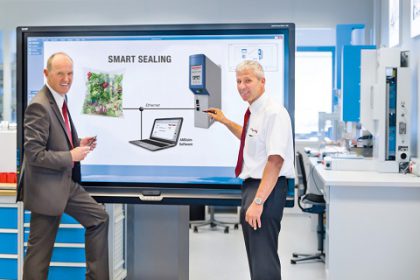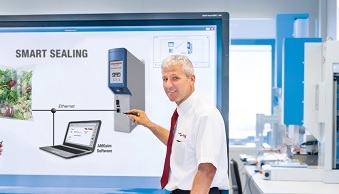 Frankfurt, 18 June 2019 – Interview with Thomas Herrmann, CEO at Herrmann Ultraschalltechnik GmbH & Co. KG. is an interview within the series of interviews handled by VDMA.
Frankfurt, 18 June 2019 – Interview with Thomas Herrmann, CEO at Herrmann Ultraschalltechnik GmbH & Co. KG. is an interview within the series of interviews handled by VDMA.
All players along the plastics value-added chain are joining forces in Europe to initiate a functionable circular economy. No other country has such an initiative. Will Europe soon be at a competitive disadvantage?
Herrmann: A functioning cycle for plastics is closely linked to striving for sustainability, reduced use of resources and material recycling. It is more likely that the knowledge of these processes and the development of the required technologies will bring Europe a competitive edge, as other regions will also have to deal with this issue in the future so that the European industry and research landscape will be able to occupy new export fields, in terms of machines and systems as well as process technology.
What can Herrmann Ultraschall do as part of the value-added chain? Who or what can you influence?
Herrmann: The machines and components we develop for blending plastics avoid additives such as glue or screws and, ipso facto, contribute to avoiding unnecessary use of material or material compounds. For this purpose, ultrasound welding is very energy-efficient compared to other joining technologies, that means the welding process uses very little energy. Consequently, this saves resources. Ultra-sound joining technology also works with components made of recycled granulates and various bioplastics.
Plastics packaging, perceived by the public as floating layers of plastics in the oceans, have become the target of criticism. How do you deal with this criticism?
Herrmann: Of course, the pollution of oceans with plastic waste is tragic and inacceptable, but it results from incorrect handling of garbage and not from the plastics product itself. Plastics packaging plays an important role in ensuring that an ever-increasing world population is fed, and they reduce the use of natural resources. Approximately, one third of all produced foods deteriorate on the way from production to processing; that means before they can even be packaged. The right plastics packaging whose weight and CO2 footprint makes
up just a fraction of the food to be protected helps avoid this wastage. But there is still potential for improvement. The amount of unnecessary one-way packaging must be reduced, and some secondary packaging must be scrutinised.
Could bio-plastics become the commodity of the future?
Herrmann: We think that plastics from renewable raw materials will gain importance in future. Apart from process engineering and hygienic standards they must also meet ethical requirements. We must consider whether they
aren’t produced in fields which are then no longer available for the production of food. However, these materials will not solve the problem of pollution as they are not fully biodegradable under natural conditions.
Which commercial benefits does circular economy offer?
Herrmann: The predictable end of fossil fuel availability will lead to a clear rise in mining costs. The climate-damaging impact is already noticeable and holds great economic risks. For these reasons, circular economy can only have commercial benefits as in particular mining and production costs but also the costs of repairing damage and renaturation will decrease. It is a win-win situation for all parties involved, the economy, the environment and all mankind. Currently, processed granulate is more expensive than virgin material. From an
economic point of view, the motivation to use this is low. If, however, our technology offers vital advantages compared to other joining methods, the situation will get interesting. EU regulation would definitely help encourage and increase the use of bio- or recycled plastics.
What should politicians do to support circular economy?
Herrmann: The role of politics is to provide the framework conditions, bearing in mind global competition. We need regulation because experience shows that market response is best achieved by legal provisions. We should however beware of over-regulation. The minimum requirement is uniform European standards in order to ensure that we, in a European living and economic space, pave the way for circular economy into a successful future.
To what extent does digitalisation support the implementation of circular economy?
Herrmann: Digitalisation is a prerequisite. Plastics that circulate in a cycle will not have constant or uniform properties. The better the digital signature of the raw material is and the more data from the individual process steps can be used, the better the recycling steps will work. In other words, all information along the value-added chain must be consistently available to enable the appropriate additional processing steps for closing the cycle.
Image caption:
Increased sealing quality and integrated, networked quality control – this saves packaging material and conserves resources. CEO Thomas Herrmann and Head of Development Marco Lanza discuss the digital requirements for the Circular Economy.
************************
Why Should Be “A Paid-Subscriber” and “Advertiser”
Keeping an independent media in countries that impose limitations on self supporting media, will help to support the humankind’s freedom. If you believe it, please act to be a PRO-MEMBER by clicking “HERE“, or:














